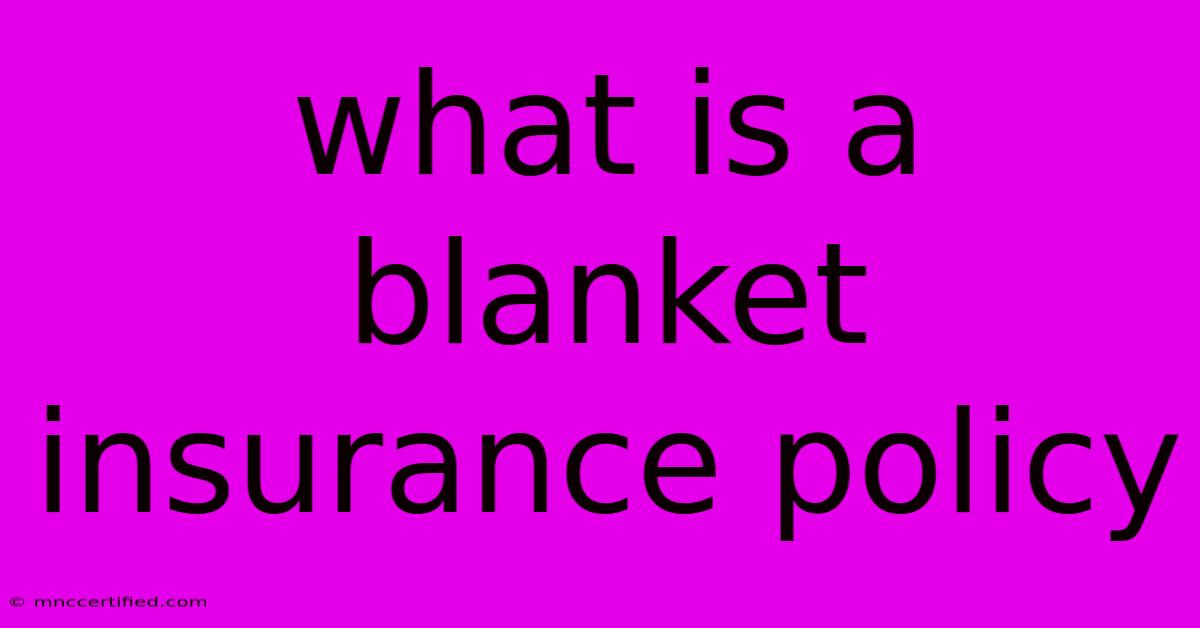What Is A Blanket Insurance Policy

Table of Contents
What is a Blanket Insurance Policy? Your Comprehensive Guide
A blanket insurance policy offers a broad spectrum of coverage, unlike specific policies that target individual assets or liabilities. It acts as an umbrella, protecting a defined group of items or a specific type of risk under a single policy. This simplifies risk management and can often prove more cost-effective than obtaining individual policies for each asset. This comprehensive guide will delve into the nuances of blanket insurance, helping you understand its benefits and drawbacks.
Understanding the Scope of Blanket Coverage
The key characteristic of a blanket policy is its broad coverage. Instead of insuring individual items separately, it covers a group of similar items or risks under one policy. This "blanket" extends to all items within the specified group, up to a predetermined limit. For example, a business might use a blanket policy to insure all its equipment, rather than insuring each piece of equipment individually. This eliminates the administrative burden of managing numerous separate policies.
Types of Blanket Insurance Policies
Blanket insurance policies are available for various needs. Some common examples include:
- Blanket Property Insurance: This protects a range of properties owned by a business or individual, such as buildings, equipment, inventory, and even vehicles. It's particularly useful for businesses with multiple locations or a large volume of assets.
- Blanket Liability Insurance: This covers liability claims arising from various sources, offering protection against potential lawsuits. It can include general liability, product liability, and professional liability (Errors & Omissions).
- Blanket Crime Insurance: This covers losses resulting from various criminal activities such as employee dishonesty, forgery, and theft. It offers a comprehensive approach to safeguarding against financial losses caused by criminal acts.
- Blanket Medical Insurance: Some group health insurance plans operate on a blanket system, covering employees and possibly their dependents under a single master policy.
Advantages of Blanket Insurance Policies
Choosing a blanket insurance policy comes with several compelling advantages:
- Simplified Administration: Managing one policy is significantly easier than handling multiple individual policies. This reduces administrative costs and paperwork.
- Cost-Effectiveness: Often, blanket insurance policies offer a lower overall premium compared to the sum of individual policies covering the same assets or risks. This results in potential cost savings.
- Comprehensive Coverage: A blanket policy provides comprehensive protection, reducing the risk of gaps in coverage. This ensures broader protection against unforeseen events.
- Increased Efficiency: Claim processing is often streamlined with a blanket policy, making the process simpler and faster.
Disadvantages of Blanket Insurance Policies
While offering numerous benefits, blanket insurance policies also have certain limitations:
- Higher Deductibles: Blanket policies sometimes come with higher deductibles than individual policies, potentially impacting out-of-pocket expenses.
- Limited Customization: The terms and conditions of a blanket policy might be less flexible than those of individual policies, offering limited room for customization to specific needs.
- Complexity: Despite simplifying administration, understanding the intricacies of a blanket policy's coverage can be more complex than understanding individual policies.
Choosing the Right Blanket Insurance Policy
Selecting the right blanket insurance policy necessitates careful consideration. Factors to evaluate include:
- Assessment of Risks: Thoroughly analyze the specific risks associated with your assets or liabilities.
- Coverage Limits: Determine the appropriate coverage limits to adequately protect your assets.
- Premium Costs: Compare premiums offered by different insurers.
- Policy Terms and Conditions: Carefully review the policy's terms and conditions before signing.
- Consult with an Insurance Professional: Seek professional advice from an experienced insurance broker or agent to help navigate the complexities of blanket insurance policies and choose the best fit for your specific needs.
Conclusion: Is a Blanket Insurance Policy Right for You?
A blanket insurance policy is a powerful tool for managing risk and protecting assets, particularly for businesses or individuals with numerous similar assets or facing diverse risks. However, it's crucial to carefully weigh the advantages and disadvantages before opting for this type of coverage. Consulting with an insurance professional is highly recommended to ensure you select the policy that best fits your unique needs and circumstances. Remember to thoroughly research and compare options before making a decision. This will allow you to gain the best possible protection at a cost-effective rate.

Thank you for visiting our website wich cover about What Is A Blanket Insurance Policy. We hope the information provided has been useful to you. Feel free to contact us if you have any questions or need further assistance. See you next time and dont miss to bookmark.
Featured Posts
-
Ronaldo Shines Portugal Beats Poland
Nov 16, 2024
-
Disney Stock On Track For Record Win Streak
Nov 16, 2024
-
Support For Davina Mc Calls Diagnosis
Nov 16, 2024
-
Romanian Federations Fan Code Of Conduct
Nov 16, 2024
-
Uefa Nations League Romania Vs Kosovo Stopped
Nov 16, 2024